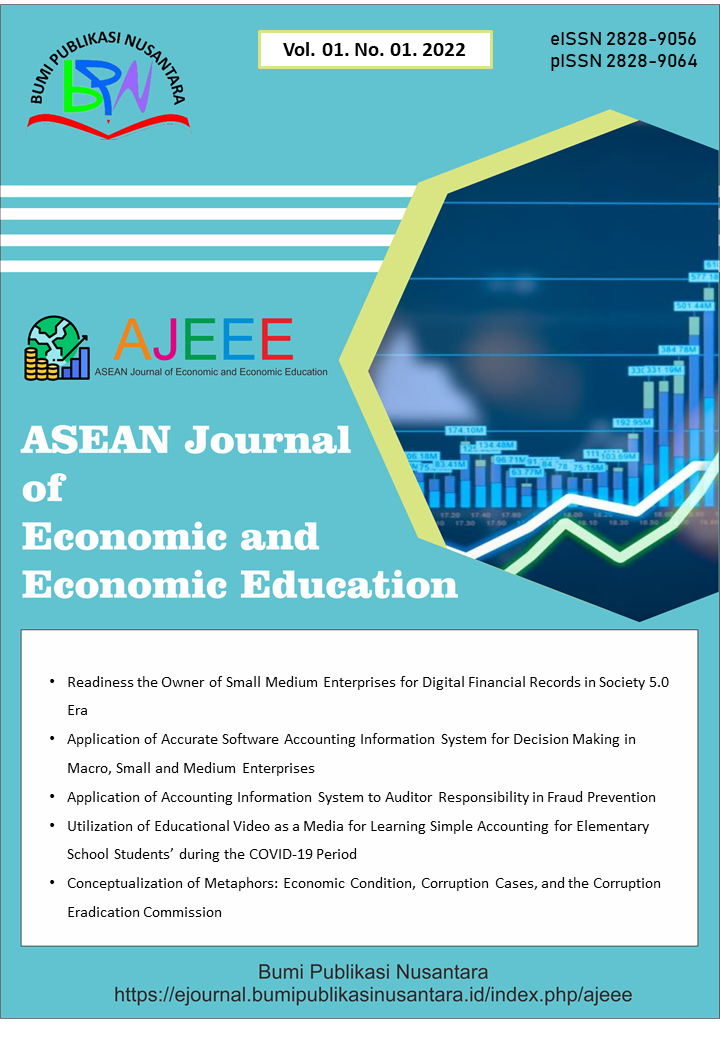Entrepreneurial Competency Among Students of the Fashion and Apparel Program at Skill Center Malaysia
 ), Hairul Akmal Muhamad(2), Rohayu Roddin(3), Marina Ibrahim Muktar(4), Halizah Awang(5),
), Hairul Akmal Muhamad(2), Rohayu Roddin(3), Marina Ibrahim Muktar(4), Halizah Awang(5),
(1) Universiti Tun Hussein Onn Malaysia
(2) GIat Mara Malaysia
(3) Universiti Tun Hussein Onn Malaysia
(4) Universiti Tun Hussein Onn Malaysia
(5) Universiti Tun Hussein Onn Malaysia
 Corresponding Author
Corresponding Author
Abstract
Keywords
References
Ab Rashid, A.H., Mupit, S., and Rahim, M.A. (2018). Kecenderungan pelajar terhadap keusahawanan di Kolej Komuniti Segamat 2. BITARA International Journal of Civilizational Studies and Human Sciences, 1(3), 31-42.
Amiruddin, M. H., Jafaar, S. N., and Samad, N. A. (2017). Tahap pengetahuan, kemahiran dan kebolehupayaan pelatih pendawaian elektrik dalam pembentukan usahawan teknikal di giat mara Negeri Johor. Sains Humanika, 9, 1-5.
Arasti, Z., Kiani Falavarjani, M., dan Imanipour, N. (2012). Penyelidikan kaedah pengajaran dalam kursus keusahawanan untuk peserta siswazah. Pengajian Pengajian Tinggi, 2(1), 2-10.
Chwolka, A., dan Raith, M.G., 2012. Nilai perancangan perniagaan sebelum permulaan - perspektif keputusan-teoritis. Journal of Business Venturing, 27(3), 385-399.
DeJaeghere, J., and Baxter, A. (2014). Entrepreneurship education for youth in sub-Saharan Africa: A capabilities approach as an alternative framework to neoliberalism’s individualizing risks. Progress in Development Studies, 14(1), 61-76.
Hanapi, Z., Kamis, A., Kiong, T. T., and Hanapi, M. H. (2016). Jurang integrasi kemahiran employabiliti di Malaysia: Satu kajian empirikal graduan kejuruteraan Kolej Komuniti. Geografia: Malaysian Journal of Society and Space, 3(3), 145-153.
Hashim, N., Chang, P.K., and Abd. Rahman, P. (2016). STOPS: Mengungkai Isu kebolehpasaran graduan di Malaysia. Jurnal Komunikasi Malaysian Journal of Communication, 32(2), 139-164.
Hashim, N., Othman, N., and Buang, N. A. (2009). Konsep kesediaan keusahawanan berdasarkan penyelidikan kes usahawan industri kecil dan sederhana (IKS) di Malaysia (entreprenuership readiness concept based on case study of small medium industry (SMI) entrepreneurs in Malaysia). Jurnal Pendidikan Malaysia (Malaysian Journal of Education), 34(1), 187-203.
Ismail, A. D., Buang, N. A., and Othman, N. (2021). Kecenderungan keusahawanan terhadap aspirasi kerjaya keusahawanan atas talian dalam kalangan pelajar tingkatan 6. Malaysian Journal of Social Sciences and Humanities (MJSSH), 6(2), 9-21.
Ismail, S. I., and Kevelighan, E. H. (2018). A questionnaire survey of second year graduate-entry medical students’ perception of obstetrics and gynaecology as a future career speciality. Journal of Obstetrics and Gynaecology, 38(4), 556-561.
Kamis, A., Ab Rahim Bakar, R. H., and Asimiran, S. (2014). Validity and reliability of clothing fashion design (CFaDC) competency instrument. Middle-East Journal of Scientific Research, 19, 89-97.
Muhamad, H. (2019). Pendidikan keusahawanan di Politeknik: Kesan terhadap penguasaan kompetensi keusahawanan dalam kalangan pelajar. Internasional Seminar on Global Education, IV, 1077-1087.
Nasir, Z. M., and Hamzah, Z. A. Z. (2014). Sikap dan motivasi pelajar terhadap pembelajaran Bahasa Melayu. Procedia-Social and Behavioral Sciences, 134, 408-415.
Nawang, W. M. Z. W., Sa'at, N. H., Ahmad, S., and Mamat, I. (2016). Kebaikan pekerjaan keusahawanan sebagai pengantara antara faktor-faktor peramal dan kecenderungan pelajar menceburi kerjaya keusahawanan. Sains Humanika, 8(1), 23-29.
Othman, N. and Ishak, I. (2011). Kecenderungan terhadap pemilihan kerjaya keusahawanan mengikut persepsi peserta skim usahawan siswa. Jurnal Teknologi, 56, 47–63.
Rozali, N., Abdullah, S., Mansor, Z. and Salleh, B. Y. (2017). Penerokaan bidang keusahawanan sosial dalam konteks pengiktirafan peluang dalam kalangan usahawan sosial orang kurang upaya (OKU). Journal of Global Business and Social Entrepreneurship (GBSE), 1(1), 21–28.
Said, S. M., Hasan, A., Monzaid, E., and Zaime, A. F. (2018). The development of green competency elements among polytechnic lecturers in Malaysia. Advanced Science Letters, 24(4), 2729-2733.
Wahab, N. N. A., Muhammad, N., and Abdullah, G. (2017). Faktor rangkaian dan kejayaan firma usahawan: Amalan agama sebagai penyederhana. Journal of Humanities, Language, Culture and Business (HLCB), 1(1), 13-21.
Article Metrics
Abstract View : 1231 times
: 1231 times Download : 842 times
Download : 842 times
Refbacks
- There are currently no refbacks.
Copyright (c) 2023 Bumi Publikasi Nusantara

This work is licensed under a Creative Commons Attribution-ShareAlike 4.0 International License.



_publication_ethics1.png)



